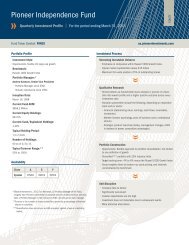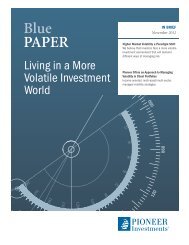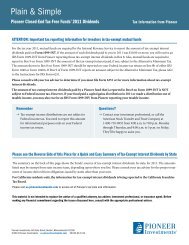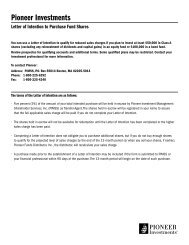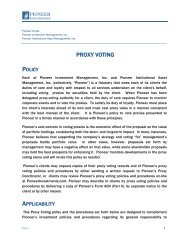Pioneer PRISM XC Variable Annuity - Pioneer Investments
Pioneer PRISM XC Variable Annuity - Pioneer Investments
Pioneer PRISM XC Variable Annuity - Pioneer Investments
Create successful ePaper yourself
Turn your PDF publications into a flip-book with our unique Google optimized e-Paper software.
entire amount of all future payments are includable in<br />
taxable income.<br />
The IRS has not furnished explicit guidance as to how the<br />
excludable amount is to be determined each year under<br />
variable income annuities that permit transfers between<br />
investment portfolios after the annuity starting date.<br />
Consult your tax adviser.<br />
Taxation of Death Benefit Proceeds. Amounts may<br />
be distributed from a Non-Qualified Contract because of<br />
your death or the death of the annuitant. Generally, such<br />
amounts are includible in the income of the recipient as<br />
follows: (i) if distributed in a lump sum, they are taxed in<br />
the same manner as a surrender of the contract, or (ii) if<br />
distributed under a payout option, they are taxed in the<br />
same way as annuity payments.<br />
See the Statement of Additional Information as well as<br />
“Death Benefit — General Death Benefit Provisions” in this<br />
prospectus for a general discussion on the federal income<br />
tax rules applicable to how death benefits must be<br />
distributed.<br />
Transfers, Assignments or Exchanges of a<br />
Contract. Where otherwise permitted under the terms of<br />
the contract, a transfer or assignment of ownership of a<br />
Non-Qualified Contract, the designation or change of an<br />
annuitant, the selection of certain maturity dates, or the<br />
exchange of a contract may result in certain adverse tax<br />
consequences to you that are not discussed herein. An<br />
owner contemplating any such transfer, assignment,<br />
exchange or event should consult a tax adviser as to the tax<br />
consequences.<br />
Withholding. <strong>Annuity</strong> distributions are generally subject<br />
to withholding for the recipient’s federal income tax<br />
liability. Recipients can generally elect, however, not to<br />
have tax withheld from distributions.<br />
Multiple Contracts. The tax law provides that deferred<br />
annuities issued after October 21, 1988 by the same<br />
insurance company or an affiliate in the same calendar year<br />
to the same owner are combined for tax purposes. As a<br />
result, a greater portion of your withdrawals may be<br />
considered taxable income than you would otherwise<br />
expect. Please consult your own tax adviser.<br />
Ownership of the <strong>Investments</strong>. In certain<br />
circumstances, owners of variable annuity contracts have<br />
been considered to be the owners of the assets of the<br />
underlying Separate Account for Federal income tax<br />
purposes due to their ability to exercise investment control<br />
over those assets. When this is the case, the contract<br />
owners have been currently taxed on income and gains<br />
attributable to the variable account assets. There is little<br />
guidance in this area, and some features of the contract,<br />
such as the number of funds available and the flexibility of<br />
the contract owner to allocate premium payments and<br />
transfer amounts among the funding options, have not<br />
been addressed in public rulings. While we believe that the<br />
contract does not give the contract owner investment<br />
control over Separate Account assets, we reserve the right<br />
to modify the contract as necessary to prevent a contract<br />
owner from being treated as the owner of the Separate<br />
Account assets supporting the contract.<br />
Further Information. We believe that the contracts will<br />
qualify as annuity contracts for federal income tax<br />
purposes and the above discussion is based on that<br />
assumption. Further details can be found in the Statement<br />
of Additional Information under the heading “Tax Status<br />
of the Contracts.”<br />
Taxation of Qualified Contracts<br />
The tax rules applicable to Qualified Contracts vary<br />
according to the type of retirement plan and the terms and<br />
conditions of the plan. Your rights under a Qualified<br />
Contract may be subject to the terms of the retirement plan<br />
itself, regardless of the terms of the Qualified Contract.<br />
Adverse tax consequences may result if you do not ensure<br />
that contributions, distributions and other transactions<br />
with respect to the contract comply with the law.<br />
Individual Retirement Accounts (IRAs). IRAs, as<br />
defined in Section 408 of the Internal Revenue Code<br />
(Code), permit individuals to make annual contributions of<br />
up to the lesser of the applicable dollar amount for the year<br />
(for 2009, $5,000 plus, for an owner age 50 or older,<br />
$1,000) or the amount of compensation includible in the<br />
individual’s gross income for the year. The contributions<br />
may be deductible in whole or in part, depending on the<br />
individual’s income. Distributions from certain retirement<br />
plans may be “rolled over” into an IRA on a tax-deferred<br />
basis without regard to these limits. Amounts in the IRA<br />
(other than non-deductible contributions) are taxed when<br />
distributed from the IRA. A 10% penalty tax generally<br />
applies to distributions made before age 59½, unless an<br />
exception applies. The contract (and appropriate IRA tax<br />
endorsements) have not yet been submitted to the IRS for<br />
review and approval as to form. Such approval is not<br />
required to constitute a valid Traditional IRA or SIMPLE<br />
IRA. Such approval does not constitute an IRS<br />
53





